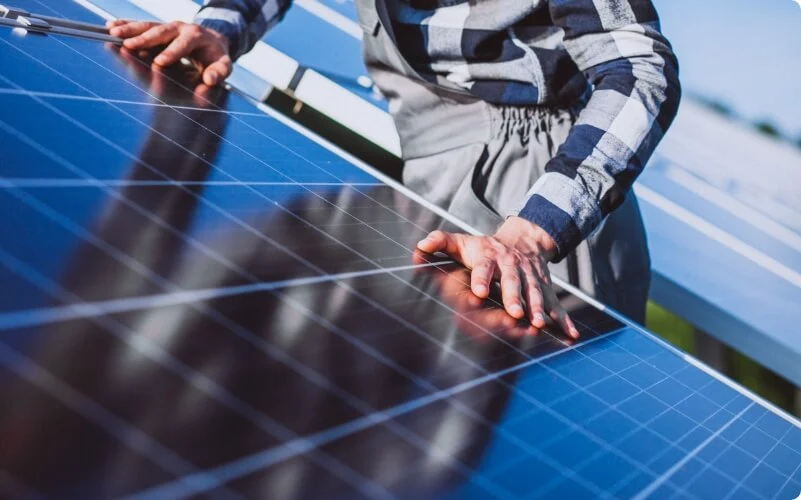Housing Society
Submit a Solar Project Enquiry
We will contact you for further discussion.
Why choose Techzeal Info ?
Driving Mass Adoption Of Rooftop Solar
Consulted
Consulted
Consulted
A Guide To Going Solar For Housing Societie
- How much can we save by going solar
- What’s the right solar size for our society
- What technologies should I choose
- Common myths about rooftop solar

Safety. Quality. Best Price. We Get It.
We Are Experts In Structure Design For High Rises

Housing Society Rooftop Solar Systems in India
Out of all the monthly expenses that a housing society has to pay for the common area activities, electricity bills are the biggest expenditure.
It’s the moral obligation of the solar power housing association to make residents aware of the fact that using solar power for housing societies can reduce the common area electricity cost substantially.
The rooftop area of a housing society is owned by its RWA (Residents Welfare Association). The Corpus (the maintenance charges that the residents pay every month) collected every month amounts to crores of rupees in a span of 10 years or so.
When the solar power housing committee (RWA) invests that Corpus in installing a solar power system for housing society, they’re practically investing in free electricity generation to power up common area amenities like water pumps, lifts, lights in parking and on every floor, and so much more!
We, at Techzeal, understand that the RWA requires headache-free solar installation; hence, we offer a 5-year AMC (Annual Maintenance Contract). It means, we ensure the regular cleaning and maintenance of the solar panel for housing society for the coming five years.
Once you’re our client, whether or not your rooftop solar power system for housing society is generating electricity is our headache, not yours!
Frequently Asked Questions
You can use the empty space on your roof to install a solar system which will convert sunlight into electricity for your house or building. Such a system is referred to as a rooftop solar system.
How Solar Power Works?
A solar power system for housing society works the same way it does for an individual house. The only difference is that the power being generated here is huge.
- When light falls on the solar panel for housing society, the PV cells convert that light into DC power.
- That DC power is converted into AC power with the help of a solar inverter.
- AC power is fed into a bi-directional meter set up to handle the common area power needs of the housing society.
The bi-directional meter keeps a record of the number of units imported from the grid and the number of excess units exported to the grid.
If there’s been additional power from the DISCOM that has been used above the solar power that’s generated, you will have to pay for that imported electricity.
If the power generated by the solar system for housing society has been more than the power consumed, and you supplied electricity to the grid, DISCOM will pay you for the power you provided.
Benefits Of Using Solar Power For Your Housing Society
Solar energy for housing society is free. What you’ll invest as the upfront cost will be recovered within 3 to 5 years, and you’ll continue to get free electricity for almost 25 years.
The benefits that the society draws from installing a solar power housing system are:
- A dramatic reduction in the common area utilities electricity bill.
- The reduction of the carbon footprint.
- Better rooftop maintenance.
- A cooler rooftop due to the installation of the solar power system for housing society. Needless to say, if the roof is cooler, so is the rest of the building.
The savings on the common area electricity bill can be used for other activities like amping up the security, installing a children’s play area, rainwater harvesting, and much more.
The benefits that the residents draw from the installation of a rooftop solar system are:
- The monthly CAM (common area maintenance charges) they pay for common area electricity reduces.
- They get to enjoy the pride of dwelling in a society that has adopted a sustainable way of living.
- The sale value of a property with rooftop solar is higher than normal property rates in the same locality. So, homeowners get to sell or rent their property at higher prices.
Why Choose Techzeal For Installing Solar Power Housing Systems?
When the solar power housing committee decides to use solar energy for housing society, it’s not their individual decision. Since Corpus is actually the money of the residents, the management committee must have the approval of the residents.
The route to getting the approval of the residents to allow the installation of solar power housing systems can be awfully long. There’s an Annual General Meeting (AGM) where the RWA has to get the much-needed approval.
Since it can be quite a task to bring all the residents on the same page, we help the solar power housing association to prepare for the AGM.
At Techzeal, we take pride in the fact that we take a consultative approach. We help the management committee educate the residents about the monetary benefits of installing solar power housing systems.
Choosing Techzeal means:
- Getting a 5-year AMC contract.
- Having the guidance of engineers with expertise in designing solar systems for high-rise buildings where the wind speed is very high.
- Receiving the best suggestions on the types of solar modules and technology that’ll be most beneficial for your society.
FAQs
1) What Are The Benefits Of Installing Solar Power In Your Housing Society?
Installing solar power in housing societies has the following benefits:
- It reduces the electricity bill for all common area activities since electricity generated from Solar energy is free.
- It reduces the carbon footprint of the entire society.
- It increases the sales value of the apartments.
2) What Is The Solar Panel Installation Cost For A Housing Society?
The solar panel installation cost for a housing society isn’t fixed. It depends upon the size of the solar system installed. The larger the system, the more the cost!
3) What Is The Subsidy On Solar Panels For Housing Society?
PM Narendra Modi launched a National Portal for Rooftop Solar and a unified subsidy scheme on 30th July 2022.
The subsidy scheme is known as DBT (Direct Benefit Transfer).
Under this scheme, here is the subsidy offered to housing societies.
Plant capacity | Applicable subsidy |
First 10 kW | ₹94,822 fixed |
> 10 kW | ₹7,294/ kW for common facilities up to 500 kWp @ 10 kWp per house |
